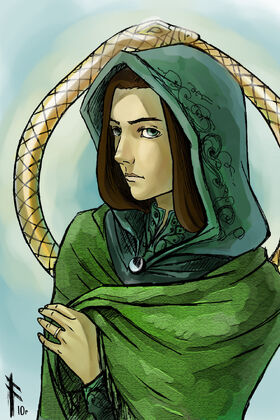 Afterward, I was struck by the fact that such a decision should not have been anything unusual. I've played dwarves, monsters, vampires, elves, demigods, and wizards. I've played people from other countries (both real and fictional); I've played as warriors and mages, saints and sinners, the faithful, the faithless, and even the insane. But despite my eagerness to learn about roles and society by playing them out, there was always a slight hesitation, a sense of unease at the thought of playing a woman.
Afterward, I was struck by the fact that such a decision should not have been anything unusual. I've played dwarves, monsters, vampires, elves, demigods, and wizards. I've played people from other countries (both real and fictional); I've played as warriors and mages, saints and sinners, the faithful, the faithless, and even the insane. But despite my eagerness to learn about roles and society by playing them out, there was always a slight hesitation, a sense of unease at the thought of playing a woman.Why should this be? I wondered. Am I afraid of showing any feminine qualities? Am I secretly sexist or something? (I do this to myself all the time. I have no idea why.)
But nobody I know (at least, nobody I play with) has ever, to my knowledge, played any character not of their own gender. In a game where you could play as literally anyone, become virtually anything, why is it that so many players refuse to step outside their own gender, when they would eagerly play a character of a different race, religion, status, socioeconomic background, profession, alignment, age, and even species? This seems like an odd line to be unwilling to cross.

having to actually roleplay the clothes.)
Many players might argue that "I'm a man, and therefore I don't know how a woman would think, so I just won't play as a woman." Well, yeah, but you play as dwarves all the time, and no one knows how they think! They don't even exist!
Hang on, maybe I just hit the nail on the head.
Since no one knows how a dwarf would act, no one can accuse you of getting it wrong, or of being culturally insensitive. You're free to make it up as you go, rather than having to mimic reality.
Then again, maybe players are simply afraid of getting it too right. The players of tabletop RPGs are for the most part male, and dislike showing any side of themselves that might be labeled "feminine", for fear of setting off a wave of all-too-familiar hetero-normative panic.
 A fourth option: most tabletop RPGs are created by male designers, with a largely-male audience in mind. As a result, RPGs tend (in both theory and practice) towards a male perspective and a male play-style. From a tween or teenage boy's perspective, a female character lacks the strength for how he wants to play (i.e., hack-and-slash), and her social skills would appear irrelevant and "lame" to him.
A fourth option: most tabletop RPGs are created by male designers, with a largely-male audience in mind. As a result, RPGs tend (in both theory and practice) towards a male perspective and a male play-style. From a tween or teenage boy's perspective, a female character lacks the strength for how he wants to play (i.e., hack-and-slash), and her social skills would appear irrelevant and "lame" to him.But I have noticed an interesting corollary to the above observation: playing a female character is not at all uncommon among the male players of MMOs like "World of Warcraft". Perhaps this is because online play tends to involve very little roleplaying, so boys don't feel like they're required to "act all girly" if they do choose to play a female.
Is this a sign that boys of today are more comfortable with female roles? Or does it suggest that our boys increasingly view women's bodies as objects, as pretty shapes to stare at while they run around an online environment?
Only time will tell.

Very thoughtful, SuperDave. Probably one of my favorite pieces you've ever done, because you're not just writing about what happened in the latest episode of D&D, but about how it relates to a bigger issue. Woot!
ReplyDeleteI write about bigger issues! Like video games being used to cure cancer, for instance...
ReplyDeleteBut I see what you mean. I'll try to better-connect my blog to real-world issues. More cultural critique and analysis. Thank you for your comment.